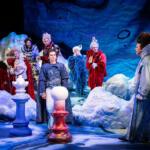Dramatic representations of ennui often have an important decision to make at the onset of their development: should they force their audience to experience vicariously those affects which they take as their subject, or should they convey the crushing force of those feelings through other, potentially more inventive means? Kenneth Lonergan traps his 2009 play The Starry Messenger in the former camp, emptying it of any semblance of dramatic thrust or emotional build-up. What remains—and what runs for 2 hours and 45 minutes in Sam Yates’s production at Wyndham’s Theatre—is hard to endure, not because the sense of prosaic vacuity that runs through the play is not worthwhile, but because the way in which it saturates the work is much less riveting than it could have been.
At the center of The Starry Messenger is the anhedonic Mark, an astronomer in his fifties who teaches adult classes at New York’s Hayden Planetarium as a substitute for his failed dream of becoming a hands-on researcher in the field. Despite the annoying eccentrics who fill his classroom, he seems to care about his work and to have made peace with his uninspiring life. At home, he is amicably tormented by domestic minutiae, gently thrust on him by his wife and fifteen-year-old son. After a chance meeting with Angela, a young single mother who works as a trainee nurse, Mark finds himself embroiled in a romantic affair, which appears to hold the key to a somewhat more thrilling routine, but not without pushing him to reconsider his life.
In its obsession with the triviality of human life, The Starry Messenger moves at a glacial pace and presumes to make a virtue of its own uneventfulness. Yet, having been misapplied, virtue turns into vice, for there is barely anything in the play to counterbalance the absence of a strong plot. The intentional triteness of much of the dialogue is more artificial than naturalistic, more cringe-worthy than relatable. So it is with the characters: for a play that orients itself primarily around one small man’s life, Mark’s figuration is not particularly piercing. Granted, our prolonged exposure to his calm surface does yield glimpses of the tempests beneath it, made especially evident in a beautiful scene where he suddenly breaks into tears in the middle of his living room. But the nature of those tempests remains largely opaque, untouched. Matthew Broderick’s fine but ultimately sapless performance is partially responsible for this: he does not delve into Mark’s apathy and self-derogation in the way one would expect from an actor of his caliber. He has a hard time revealing the soul of his character and often takes refuge in monotonous delivery and gait in an attempt to depict a man frozen by his own will.
Even more disappointing is his wife Anne: though played brilliantly by Elizabeth McGovern, the character is so flat and insubstantial that one cannot help but wonder what, if anything, her absence would change in the play. Woefully underwritten, Anne is almost a prop whose sole purpose is to taunt Mark with benign but endless questions. Perhaps the most intriguing and well-developed character here is Angela: fittingly, the real star in the universe of this show is Rosalind Eleazar, whose thoughtful and sincere performance gradually forms the emotional core of the production. She does a great job of reflecting her character’s deep-running sorrow and youthful optimism, and her rendering gets even better as Angela experiences an unthinkable tragedy. Among the supporting cast, Sid Sagar and Jenny Galloway (as Mark’s outlandish students) give delectably witty performances that provide some necessary comic relief, administering electric shocks to an otherwise bland stage.
Then again, we have the question of what astronomy is doing in this play. Throughout, Lonergan gestures towards the tension between the diminutive significance of individual grievances against a cosmic scale and the epic dimension of those turmoils when experienced subjectively. There is no easy to way to square these two realities, and Lonergan does not try to do so, but the prospect of grappling with this perceptual double-bind may still have been worth a shot. The play’s gratuitous and thin discourse on astronomy is not so much an integral element of the plot or characterization as a replaceable gimmick to co-opt a contemplative vocabulary. For all we care, Mark could have been a biologist or a chemist thinking about life from bottom up rather than top down. There is nothing intrinsically significant about the play’s engagement with the universe and our elusive place in it that creates intellectual rigor or an emotional punch. Even Mark’s long speech at the end, which has too much of Carl Sagan in it, is too campy—and his delivery too rhetorical—to sum up the play’s preoccupation with the wonders of astronomy into a resonant force.
A lot of the scenes in The Starry Messenger take place in a hospital room where Angela takes care of an old and dying patient, often in the presence of his distressed daughter. Almost all the highlights of the play are to be found in these scenes, which evince much dramatic vigor and potential. Yet as refreshing and promising as they are, many of these scenes are simply dispensable; they may even be said to belong to a different play altogether. Their contributions to what Lonergan is trying to do in this play are uneven and uncertain, which should help us diagnose why the play is just way too long. In an alternative universe, The Starry Messenger could be radically decluttered, find a meaningful through-line, and run up to no more than an hour and a half. All of which is to say: it could have really benefited from a dramaturg’s touch.
That The Starry Messenger’s dramatic aspirations are intelligible makes it perhaps more disappointing when we find them ultimately unfulfilled. Much of this, of course, is also characteristic of Mark’s own despair: he, too, knows what he would do and how he would be in ideal terms, but is all too aware of his middling reality. This bizarre correspondence between the whole and the part may have something of a cosmic harmony in it, but still, it would be a better use of one’s time to visit other heavenly bodies in the universe of Lonergan’s oeuvre.
This post was written by the author in their personal capacity.The opinions expressed in this article are the author’s own and do not reflect the view of The Theatre Times, their staff or collaborators.
This post was written by Mert Dilek.
The views expressed here belong to the author and do not necessarily reflect our views and opinions.


















